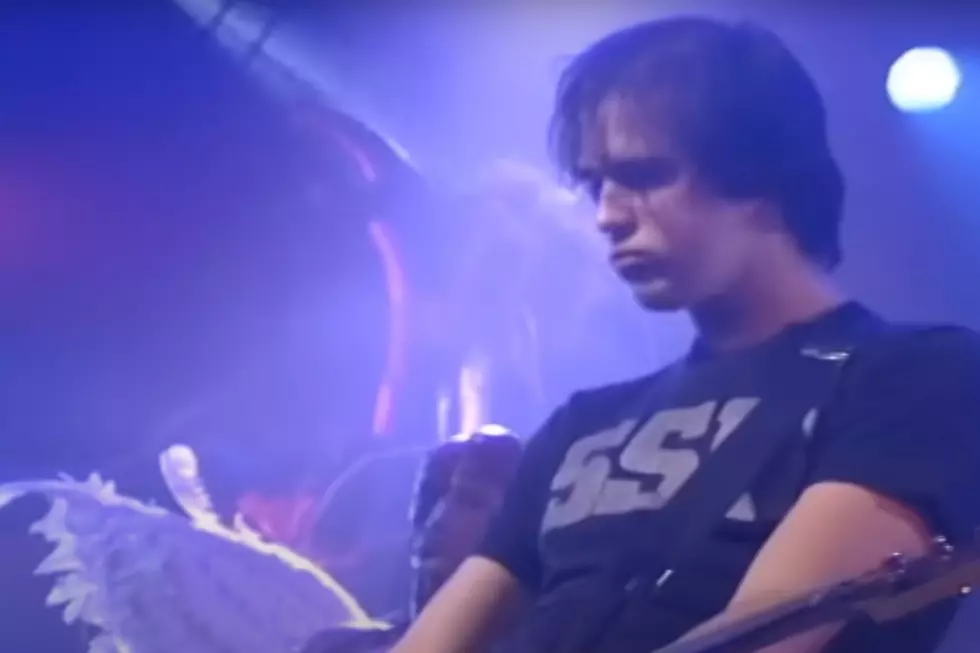
Why Krist Novoselic Was the ‘Unsung Hero’ of Nirvana
Though Nirvana's time as a band was brief, it lasted longer than it might have, thanks to bassist Krist Novoselic.
That's one thing that author Michael Azerrad shared with Ultimate Ciassic Rock Nights host Matt Wardlaw during a recent appearance on the show. It's a subject that he can speak authoritatively about. In 1993, he was tapped by Courtney Love and Kurt Cobain to write the first proper book about Nirvana, with participation from the band and its associates.
As it turns out, Azerrad was documenting valuable history. Barely six months after his book, Come As You Are, was released, Kurt Cobain was gone, dead at the age of 27. During the pandemic, he revisited the whole of his original work, going through every word to annotate and provide fresh perspective and further context about the events he had written about.
The Amplified Come As You Are: The Story of Nirvana stretches out across over 500 pages, more than double the length of the initial book and presents a fascinating view of the band's history. Azerrad joined UCR to share some stories as well as his own personal history with the group.
How did you first become aware of Nirvana?
I became aware of Nirvana when Bleach came out. I thought, "Wow, that’s some burly, but catchy rock and roll." I liked the band and it was really interesting that they had that one Beatle-y song on the record. I thought, “Wow, these guys have a little melodic thing happening, I wonder where that’s going to go?” A couple of years after that, I was working at MTV News. One day, a colleague of mine, Carol Candeloro, who was a producer at MTV News, kept playing this one album over and over in her office with the door closed. But I could hear it through the door. I kept thinking, “Wow, that’s a great song” and “Oh, that’s a great song too!” She would obsessively play this record and it just got burned into my mind, even just hearing it through the door. Finally, I walked into her office and I said, “What are you playing? It’s great!” She said, “Oh, it’s Nirvana.” I thought, “Wow, like that grunge band? That’s them?” Because [Nevermind] was such a quantum leap in every way. The songwriting, the melodies, but also the production. It was like, WOW. I mean, Bleach was great in its own way, but this was like widescreen Technicolor production of the same band. I thought, “This is wild.” Pretty soon after that, “Smells Like Teen Spirit” came out and it just all blew up.
Watch Nirvana's Video For 'Smells Like Teen Spirit'
There's such a huge progression, as you say, going from Bleach to Nevermind. But it seems like that's equally the case with Nevermind to In Utero.
A large leap, I think, in terms of artistic independence. You know, they made the record they wanted to make. They really respected Steve Albini. They’d listened to a lot of his records and they wanted to make a record with Steve that sounded like their dream record, not the follow-up to the multi-platinum major label debut, but the record they wanted to make. That was quite a flex, as the young people say. [Laughs] There’s not a lot of bands that could have gotten away with that. A lot of bands would have been pressured by the label to do Nevermind II. I get into this quite a bit into the book, but at the time, Geffen Records was in no position to inhibit anyone’s artistic freedom. And also, I think it was written into Nirvana’s contract that they had a great deal of artistic independence.
But Geffen had just gotten into this big to-do with Neil Young, suing him for not sounding like “Neil Young” enough. Also, Nirvana was the biggest, coolest band in the world. They didn’t want to seem uncool by cramping their style. Then, of course, there was that whole brouhaha afterwards about the label allegedly hating the record. That played out over quite a long period of time. Because again, this is pre-internet. It would have all sort of come and gone in a few days during the internet era. But because things moved slowly, you had to wait for the next Time or Rolling Stone article to come out to find out what the next step in the saga of the In Utero fracas was. So it played out over a while.
READ MORE: Nirvana Producer Recalls $100,000 Gamble Over 'In Utero'
You kind of ran away with the circus, in terms of the timing when you wrote the original Come As You Are book. You probably had some idea of what you were getting into, right?
Yes and no. I mean, intellectually, I was aware that they were a big band. And there’s a lot of controversy and some internal frictions, drugs and all of that kind of stuff. But I’d never been in the middle of anything like that. So no, I didn’t quite know what I was getting into the middle of. I was kind of green. I’d never known a heroin addict before. I’d never been up close to a really huge band before. My whole beat was indie rock bands and alt rock bands, but no one really huge. So you know, this was all new to me. I had a certain amount of naivete, which I think served me well in some respects. And yet, I think it did not serve me well in other respects. A lot of the Amplified Come As You Are book is coming back to some of that reporting with 30 years of insight and wisdom and just growing older. Also, 30 years of other information about Nirvana. Because you have to remember, there were no books about Nirvana when I was writing mine. There wasn’t YouTube, the Internet or anything to research or double-check anything. I was just flying by the seat of my pants. I think it turned out really well, but that’s exactly why there’s so much to say about it now.
You were at Nirvana's famous Reading performance in 1992. There were rumors the band wasn't going to show up. Were you aware of that?
Oh yeah, that was the big rumor around the festival. You know, the English music weeklies, I think they were just playing that up because they liked a lot of melodrama. It sells copies of newspapers. I actually bumped into Kurt the night before they played in the hotel bar and bought him a screwdriver. We talked for a little bit and kind of renewed our connection that we’d made during the [initial] Rolling Stone story [in April of 1992]. So I knew he was there at the festival. I knew he was in really good spirits. He looked great and had great energy. I thought, “This is not a decrepit junkie, this is a man who is about to play the rock concert of his life tomorrow night.” I knew they were going to play, but a lot of the world did not.
How was that Reading performance?
The 1992 Reading show was really great. It actually sounded really good on stage, the monitors were pretty loud, I’m sure. But the view of the band, the audience [was] just heaving up and down, these gigantic waves of humanity and it was a really muggy, English summer night in August. It looked like the audience was on fire. There was this sea of pasty, English faces, bopping up and down with huge clouds of steam rising up off of them. It was really, really striking. And the band, it was [all really] magic. I saw Nirvana a bunch of times and I think every time I saw them in that period, it was levitational. I mean, I kind of felt like my feet were not touching the floor. I talk about a lot about this in The Amplified Come As You Are, that was the idea of the music, to get not just the audience, but Kurt, I think, in particular, out of his body and out of his pain. I think that’s also why the band is called Nirvana. That’s an absence of worldly pain. That was the idea of the music and I think that’s why Kurt, I think, threw himself into the amps and the drums at the end of a lot of shows, to show that he was impervious, that the music had made him impervious to pain. To a certain degree, I think it worked. It was really a transcendent experience. They were that great.It's true. It was really a transcendent experience. They were that great.
READ MORE: How Nirvana's 1992 Reading Set Went From 'Disaster' to 'Beautiful'
Watch Nirvana Perform 'Breed' at the Reading Festival
What did you come to appreciate more about Nirvana as a band while you were working on the new edition of the book?
One thing I came to appreciate was how essential Krist Novoselic was to the band's success. You know, he did all kinds of things, like he drove the equipment van from Tacoma, I think, to Los Angeles, when they recorded Nevermind. He would protect Kurt from angry bouncers. He was the medium between Kurt and the label or management, when Kurt didn’t want to talk to anybody. He was the guy who explained to Butch Vig that sometimes Kurt gets in a little bit of a dark mood and don’t worry, he’ll come out of it, we can continue recording. Krist was Kurt’s first fan. There’s so many things that Krist did that are not glamorous or glorious, but were essential to not just the band’s success, but even their continued existence. He really helped keep things together. As much of a livewire or loose cannon….whatever you want to call him, as Krist could be, he kind of had his act together and he was a really great influence. Reading through the book, there’s a lot of different dots that I connect in The Amplified Come As You Are, but that was a really striking one. I don’t think Krist gets enough credit for that. Aside from being great on stage and a beautiful bass player. His playing especially on In Utero, I think, there’s some really beautiful parts with just an exquisite tone. He’s kind of the unsung hero. I tried to give him a lot more props than he’s gotten previously.
You write in the book about how when you encountered Kurt for the first time, you realized he probably wasn't going to be around very long. That's a really heavy thing to process.
Yeah, it was. It was really heavy. And yet, I thought, okay, well, this is how this person is. It was basically a feeling of, let’s make the most of knowing this man. Since then, I’ve kind of applied that to almost any relationship I have with anybody. Try to make the most of this person, because you just never know. But you know, it’s also important to note that other people felt the same way. As I was researching this book, I discovered that Dave Grohl thought the same thing. Even Kurt’s mom didn’t think he would make 30. I mean, it wasn’t some sort of goofy, spooky thing that I had. A lot of people realized this. You just had to meet him once or twice to get it. Yeah, it was eerie, but that’s just the way it is.
Top 30 Grunge Albums
Gallery Credit: UCR Staff





